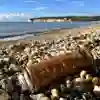Environmental impacts of legacy waste
Our researchers are working to improve our understanding and management of legacy landfill sites in coastal areas

Project summary
The Challenge
Many wastes have historically been disposed of in estuarine and coastal settings. These pose increasing environmental risks with climate change.
The Approach
To consolidate national databases, improve our understanding of the environmental behaviour of waste types and consider management priorities.
The Outcome
Improved management of legacy landfills in coastal zones and the operational management of environmental risks associated with historical wastes.
Lead academics

A major step forward
We are working closely with a range of partners to ensure our project findings are translated into operational management of environmental risks associated with historical wastes.
The Challenge
Given the UK's rich industrial past, there are a wide range of legacy wastes deposited in estuarine and coastal settings such as municipal waste, mine wastes, steel industry by-products, metal-rich wastes from smelting and chemical process wastes. These often date from an era of lax environmental regulation.
Legacy landfill sites such as these are a particular concern in coastal areas where they are likely to be affected by increased flooding, greater erosion and more extreme cycles of wetting and drying as our climate changes.
Managing such environmental issues is of critical importance, but currently we do not have a systematic framework by which we assess and understand the nature of the risks posed by different waste types in coastal areas.Professor Will Mayes
Professor of Environmental Science, University of Hull
The research team
Professor Will Mayes
Professor of Environmental Science
Dr Alex Riley
Lecturer in Environmental Science
The Approach
Funded by the Natural Environment Research Council, we are working with a range of university partners, regulatory agencies and consultants to assess the nature of these risks and help formulate sustainable management options at priority sites.
This proposal brings together a team of researchers specialising in assessing the environmental risks of legacy wastes to:
- Provide a national assessment of the environmental risks associated with legacy landfills in the coastal zone
- Provide a framework for effective management of these risks now and in the future.
The first part of the project will bring together various national databases (e.g. on location of landfills, mining waste, coastal erosion rates, coastal management plans) to provide a single map-based database of legacy landfills within the coastal zone. We will then liaise with regional specialists in government agencies and academia to collate detail on documented risks and identify high risk priority sites (e.g. those with the greatest contamination risk and / or those most affected by erosion or flooding).
The second component of the project will improve our understanding of the environmental behaviour of different waste types in coastal settings. Most risk assessments for wastes are undertaken assuming they will be in contact with freshwater (e.g. leaching tests that simulate wastes in contact with rainfall).
These conditions will simulate the current and future environmental scenarios in coastal areas such as variations in salinity and extremes of wetting and drying that are anticipated with climate change.
We will provide a significant advance on assessing environmental risks in coastal settings by testing how pollutants are released from different waste types (e.g. municipal waste, mine waste, processing wastes) under a range of environmental conditions.
Effective long term management of legacy wastes relies on many different agencies working together (e.g. councils, regulators, land owners, engineers). The final part of the project will therefore bring various stakeholders together in different parts of the UK to (1) evaluate approaches to remediation, and (2) consider management priorities put forward by the early stages of the project.
Research highlight
The research project beneficiaries will include government and policy organisations such as DEFRA and the Environment Agency, Natural Resources Wales, Scottish Environmental Protection Agency) and local authorities with opportunities to:
- Improve information on risks associated with legacy wastes
- Feed into prioritisation exercises
- Support long term management plans, accounting for climate change
Provide new policy input linking with the 25 year Environment Plan and Waste and Resources Strategy.
The Impact
The proposed work represents a major step towards improved management of legacy landfills in coastal zones. We will work closely with a range of academic and non-academic partners to ensure the project findings are translated into operational management of environmental risks associated with historical wastes.
A series workshops will take place in the different administrations of the UK to produce a national management framework for legacy wastes in the coastal zone.



